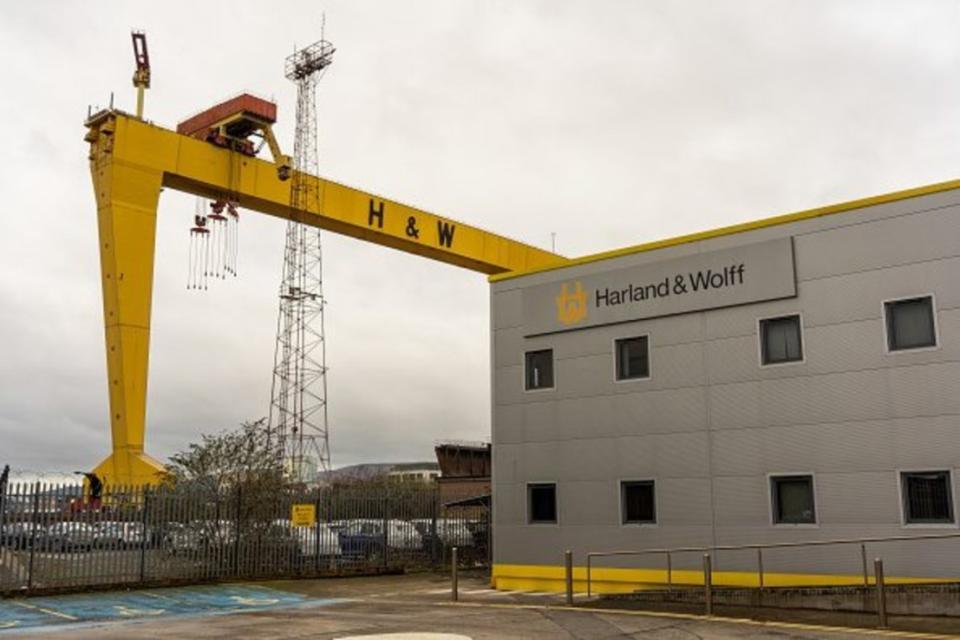CashNews.co

Crisis-hit Harland & Wolff appears to have reached a crunch point amid reports the Belfast shipyard could fall into administration as early as next week.
The news came after a number of other major revelations, including the departure of Chief Financial Officer Arun Raman and an announcement the company had launched an investigation into the “misapplication” of more than £25m in corporate funds.
It is a challenging period for the 1,500-strong workforce employed across Harland’s facilities in the UK and shareholders who have invested hard-earned cash into the business. They will receive an update from interim chair Russell Downs at a meeting this Thursday.
“The public should be made aware of this as it will have huge repercussions on many employees as well as shareholders that have had the company and in some cases their livelihoods stolen away from them,” one shareholder group, which holds around 30 per cent of the company’s shares, told City A.M.
It follows months of crisis since the new Labour government refused to guarantee a £120m loan from UK Export Finance, exposing the financial precarity of a firm which had for years been papering over the cracks.
What happened last week?
News surrounding Harland & Wolff’s likely administration will come as no surprise to those invested in its troubles. Shareholders have previously warned that a “pre-pack” administration,” in which Harland would immediately be sold to a pre-determined buyer, could lead to job losses and the break up of a company, which became famous years ago for building the Titanic.
Little information was given about the nature of CFO Raman’s departure but it follows a string of top-level exits, including that of CEO John Wood, Chairman Malcolm Groat and two other non-executive directors. It has now been reported that Raman is mooting whether to sue Harland and Wolff on grounds of racial discrimination and constructive dismissal.
Russell Downs, the former PwC restructuring expert brought in to handle the firm’s financial issues, has largely adopted a head-down approach in recent weeks, with the media kept in the dark as to the current status of Harland’s race to survive.
But in interviews over the weekend, he revealed an internal investigation had been launched into the “misapplication” of some £25m in corporate funds, alongside lower-level spending that “seemed to be for little or no financial or corporate benefit.” Former chief executive John Wood, who departed earlier in the summer following the government’s refusal to guarantee UKEF’s loan, has described news of the probe as a “ridiculous allegation,” while those close to him and Raman refute any allegations of wrongdoing, The Sunday Times reported.
But what does the investigation mean? It is important to note that misapplication does not imply misappropriation, with the inquiry ultimately needing to conclude the actual extent of any wrongdoing, if there was any at all.
Whatever the outcome, critics of Wood, who has faced backlash from investors over his decision-making while at the helm, will be glad questions are being asked. The former boss baffled many over a protracted dispute stemming from an attempt by Harland, which has no ferry-operating experience, to run a ferry operation in the Scilly Isles. That business was recently wound down by the company in a bid to cut costs, with not a single trip ever setting sail.
What happens next?
There is only one thing certain after this week; Harland & Wolff is in a complete and utter mess.
However its iconic status, not only because of its involvement in the Titanic but also the fabled status of its two collosal yellow gantry cranes Samson and Goliath, which have dominated the Belfast skyline for the last 50 years, means bidders are circling.
Sky News reported on Saturday the London-listed defence contractor, Babock International, had expressed interest in acquiring the business. Several other trade and financial bidders are also lining up, according to defence industry sources cited in the report, and it is understood Wood himself may be in the running.
Also likely to be among the suitors is Navantia, a Spanish shipbuilder which holds a major joint contract with Harland and Wolff to deliver Royal Navy ships.
Despite the potential for job losses and the break up of an iconic British industrial business, it is that contract, known as the Fleet Solid Support (FSS) programme, which is the biggest concern of those in the defence industry.
Valued at £1.6bn, its failure would mean Royal Navy warships could be built overseas, in Spain. Those closest to negotiations know it is a real possibility that placing Harland into administration will render the contract nullified.
Others have already pulled out of similar deals in recent months, given the situation. Harland & Wolff recently lost its status as the “preferred” bidder for a £120m Falkland Islands contract to redevelop a major port, piling further pressure on the group.
Any decision to terminate the FSS deal would put its entire workforce at risk of redundancy.
Few know what is really going on behind the scenes and transparency has not been forthcoming. Shares, listed on London’s Aim, have been suspended for months after accounting issues prevented the publication of the firm’s annual report. Unaudited results showed a £43m loss for last year.
The saga continues.
